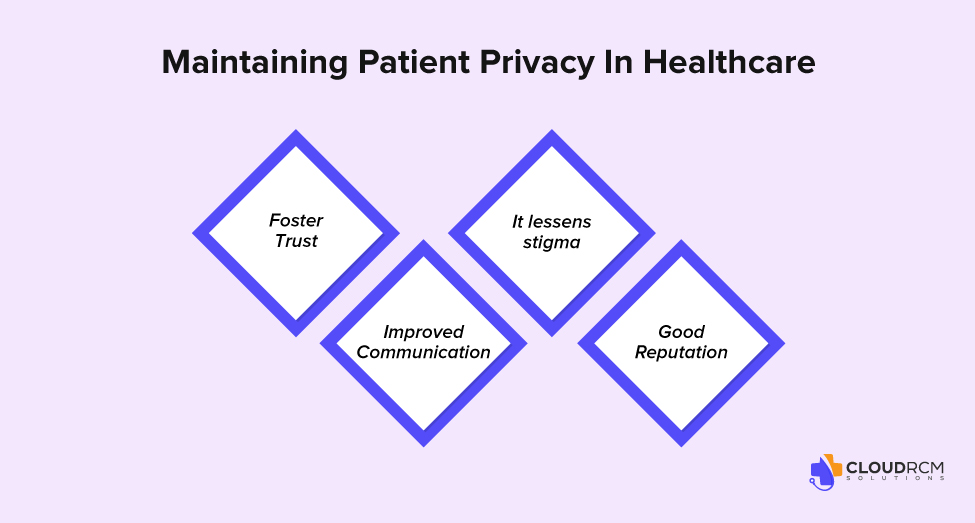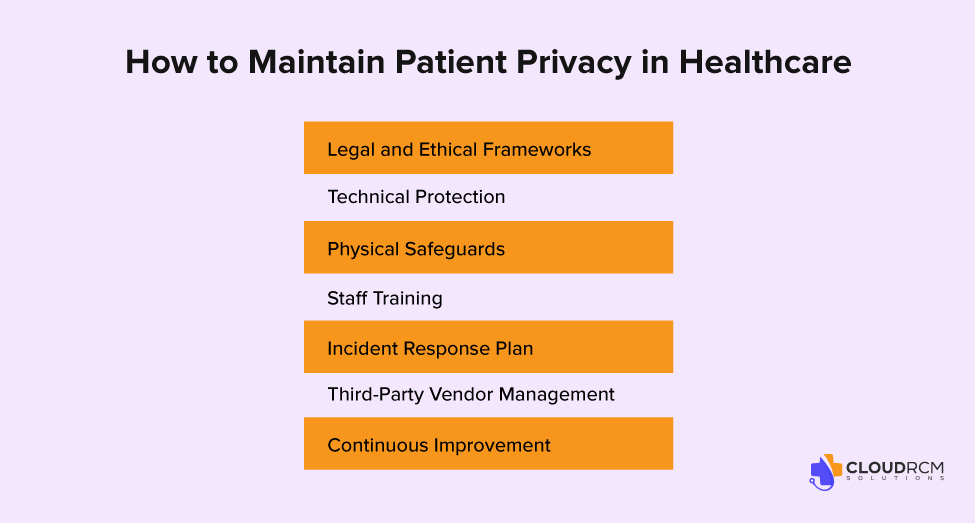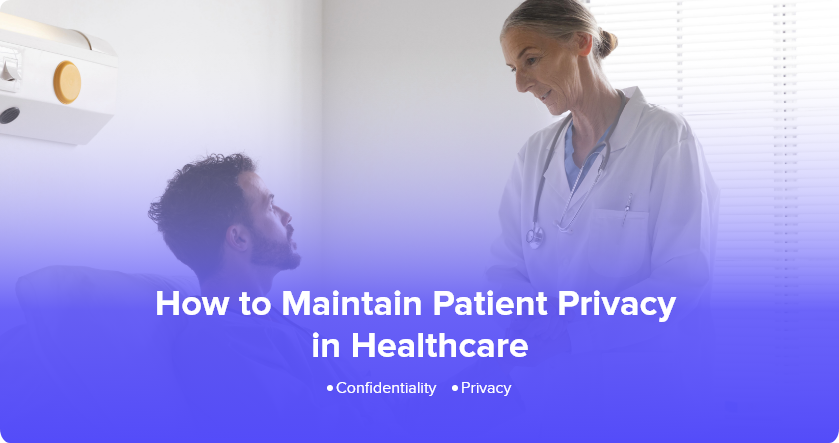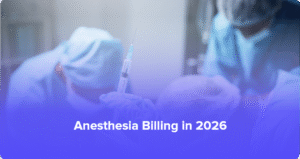HIPAA Compliance: In healthcare, patient privacy is a very sensitive element. Healthcare providers should maintain the patient’s privacy. For a healthcare provider, it is essential to stay updated with the evolving regulations and changes related to the privacy and confidentiality of patients.
With the advancement of digitalization in the healthcare system, it is very difficult to ensure that the patient’s data is secure. But we have some good news for you. We will provide you with some strategies you can integrate into your work to ensure that the patient’s data is safe.
In this blog, we will explore how you can maintain the patient’s privacy and how it can adversely affect your work if you don’t show compliance with those rules and regulations related to the patient’s privacy.
What is patient privacy in healthcare?
Patient privacy in healthcare refers to the idea that the patient’s personal information and medical details are protected from disclosure and unauthorized access. All information related to the patient must be confidential and protected by the healthcare providers. This information includes medical history, treatment records. Contact information and any other data gathered during interaction with the patient.
Read: HIPAA Basics for Providers: Privacy, Security, & Breach
Importance Of Maintaining Patient Privacy In Healthcare

In healthcare, patient privacy is crucial to build trust, encourage open communication, and ensure that the patient is receiving the best medical care. It helps patients to be comfortable enough so that they can share information, thinking their personal information is secure.
Here are some reasons why a patient’s privacy is important:
Foster Trust:
When patients feel comfortable, they can easily share their personal information when they become confident that their personal information is safe. This builds a trust relationship between the provider and the patient.
Improved Communication:
When patients feel safe, they communicate better and share the information required for a better diagnosis.
It lessens stigma:
The fear of being judged for sharing our vulnerabilities or information about our health stops us from sharing. When a patient is assured that their information is confidential, they feel safe to share their personal information.
Good Reputation:
You can build a good reputation when your patients’ information is safe. When you breach any information regarding your patient’s personal or medical information, you can also face penalties.
Laws Protecting Patient Privacy in the U.S
In the United States, the primary rules and regulations to protect patient privacy are created and enforced by the Department of Health and Human Services (HHS), specifically through the Office for Civil Rights (OCR). The main regulations governing patient privacy are:
Health Insurance Portability and Accountability Act (HIPAA):
This law, passed in 1996, sets national standards for the protection of health information. HIPAA includes rules for securing and managing Protected Health Information (PHI) and gives patients rights over their health data.
HIPAA Privacy Rule:
Establishes national standards to protect individuals’ medical records and other personal health information provided to health plans, doctors, hospitals, and other healthcare providers.
HIPAA Security Rule:
Sets standards for the protection of electronic PHI (ePHI), including administrative, physical, and technical safeguards.
HITECH Act (Health Information Technology for Economic and Clinical Health Act):
Passed in 2009 as part of the American Recovery and Reinvestment Act (ARRA), it promotes the adoption and meaningful use of health information technology, especially concerning electronic health records (EHRs). It also strengthens privacy and security protections under HIPAA.
Key Challenges Providers Face in Protecting Patient Privacy
Maintaining patient privacy in healthcare is challenging due to the growing innovations and technology in the healthcare system. Key challenges are dealing with digitalization, legal issues while keeping privacy and fairness in the healthcare system.
There are several challenges healthcare organizations and providers face in protecting patient privacy:
- HR Risks: Digital records and tools bring risks like data breaches and unauthorized access, requiring strong cybersecurity.
- Legal Complexities: Healthcare providers must use complex laws like HIPAA to protect patient privacy.
- Workplace Culture: Training staff on privacy protocols helps prevent accidental disclosures.
- Communication Barriers: Protecting patient information requires secure, private conversations in busy environments.
- Tech Training: Healthcare professionals need training to use digital tools securely.
- Social Media Risks: Staff must avoid sharing sensitive information on social media.
- Data Breaches: Healthcare organizations face constant threats of data breaches, exposing patient info.
- Data Integration: Combining data from multiple sources raises privacy concerns.
- Data Retention: Properly managing patient records is key to privacy protection and legal compliance.
- Secure Communication: Ensuring secure communication, especially in telehealth, is vital.
- Risk Analysis: Regular assessments identify privacy and security vulnerabilities.
- Telehealth Privacy: Telehealth brings privacy challenges, from securing virtual appointments to protecting stored data.
Ways To Maintain Patient Privacy In Healthcare:

Safeguarding a patient’s personal information is crucial. Healthcare providers should adhere to the legal guidelines regarding patient privacy and confidentiality. There are ways you can protect your patient’s privacy.
Legal and Ethical Frameworks
Sticking to the legal guidelines of patient privacy is essential. Adhering to the rules and regulations of laws like HIPAA (Health Insurance Portability and Accountability) is a guideline to protect the patient’s personal information.
- HIPAA Compliance: Adhere to HIPAA regulations to protect patient information and avoid penalties.
- State Regulations: Follow any state-specific privacy laws that may be stricter than HIPAA.
- Professional Ethics: Healthcare professionals must uphold confidentiality to maintain patient trust.
Technical Protection:
You can safeguard your patient information if you keep limited access to that information and keep it end-to-end encrypted.
- Access Control limited access to the patient information
- Data Encryption: The data should be encrypted from the transit to the end.
- Secure Communication: HIPAA-compliant platforms for communication
- Storage and Disposal: Securely store and dispose of the data.
- Audits: Regularly audit access logs and security measures to identify vulnerabilities.
Physical Safeguards:
You should always restrict the place from access of other people where you keep the patient’s personal information or documents. This can reduce the chances of data breach or disclosure.
Staff Training:
You should train your staff about the regulatory requirements of patient information security. Make them aware of the risks of privacy violation and what the consequences can be.
Incident Response Plan
Establish a clear plan for addressing data breaches, including containment, investigation, and patient notification.
Third-Party Vendor Management
Ensure third-party organizations or medical billing companies adhere to the same privacy standards as healthcare providers.
Continuous Improvement
Improve the privacy measure and update yourself with the changes in the regulatory policies.
HIPAA Updates and Key Changes for 2025
Recent updates to the Health Insurance Portability and Accountability Act (HIPAA) are shaping how healthcare organizations handle patient privacy. Here’s a quick overview of the key changes:
Reproductive Healthcare Privacy Protections
This change was proposed in June 2024, this rule was to protect the reproductive health information to investigate or impose liability on individuals seeking or providing lawful services. Healthcare providers must attest that PHI will not be used for these purposes.
FTC Health Breach Notification Rule Update
From April 2024, the FTC expanded its Health Breach Notification Rule to cover health apps and websites, requiring breach notifications for incidents involving 500 or more records within 60 days.
Upcoming HIPAA Security Rule Updates
In December 2024, proposed updates to the HIPAA Security Rule will require stronger cybersecurity measures, such as multi-factor authentication, encryption, and regular security audits.
HIPAA Violation Fines
HIPAA violations carry civil and criminal penalties based on the severity of the offense:
| Tier | Culpability Level | Min. Penalty per Violation | Max. Penalty per Violation | Annual Cap per Identical Violation |
| 1 | Lack of Knowledge | $141 | $35,581 | $35,581 |
| 2 | Reasonable Cause | $1,424 | $71,162 | $142,355 |
| 3 | Willful Neglect (corrected within 30 days) | $14,232 | $71,162 | $355,808 |
| 4 | Willful Neglect (not corrected within 30 days) | $71,162 | $2,134,831 | $2,134,831 |
Criminal Penalties
- Tier 1: Up to 1 year in prison and $50,000 fine
- Tier 2: Up to 5 years and $100,000 fine
- Tier 3: Up to 10 years and $250,000 fine
Enforcement
In 2024, OCR imposed over $9.9 million in fines, with common violations including failure to perform risk assessments and unauthorized access to records.
Final Thought:
Protecting patient privacy is crucial for building trust and ensuring quality care. With increasing digitalization, healthcare providers must comply with regulations like HIPAA and implement safeguards to secure patient data. Regular staff training, secure communication, and strong risk management practices are essential to prevent breaches. By staying informed and prioritizing privacy, providers can avoid penalties and strengthen patient relationships, ensuring both compliance and trust.
Concerned about HIPAA compliance in 2025?
Let’s discuss how CloudRCM can support your billing, credentialing, and privacy needs. Book your free consultation today.
FAQs:
Why is maintaining patient privacy important?
It builds trust, encourages open communication, reduces stigma, and protects patients’ personal information from misuse.
What laws protect patient privacy in healthcare?
Key laws include HIPAA (Health Insurance Portability and Accountability Act) and HITECH, which set national standards for securing patient health information.
How can healthcare providers protect patient privacy?
By following legal guidelines, implementing technical safeguards (e.g., encryption, access control), ensuring secure communication, and training staff regularly.
What are common challenges in maintaining patient privacy?
Challenges include handling digital records, complying with complex regulations, ensuring secure communication, and preventing data breaches.
What penalties exist for violating patient privacy?
Penalties range from civil fines to criminal charges, depending on the severity of the violation, including penalties for unauthorized access or data breaches.

 Medical Billing
Medical Billing Medical Coding
Medical Coding Medical Audit
Medical Audit Provider Credentialing
Provider Credentialing Denial Management
Denial Management A/R Follow-up
A/R Follow-up Private Practice
Private Practice Patient Help Desk
Patient Help Desk Customized Reporting
Customized Reporting Out-of-Network Billing
Out-of-Network Billing Internal Medicine
Internal Medicine Pediatrics
Pediatrics Radiology
Radiology Surgery
Surgery Emergency Medicine
Emergency Medicine Anesthesiology
Anesthesiology Cardiology
Cardiology Orthopedic
Orthopedic Psychiatry
Psychiatry Dentistry
Dentistry OB-GYN
OB-GYN Family Medicine
Family Medicine


